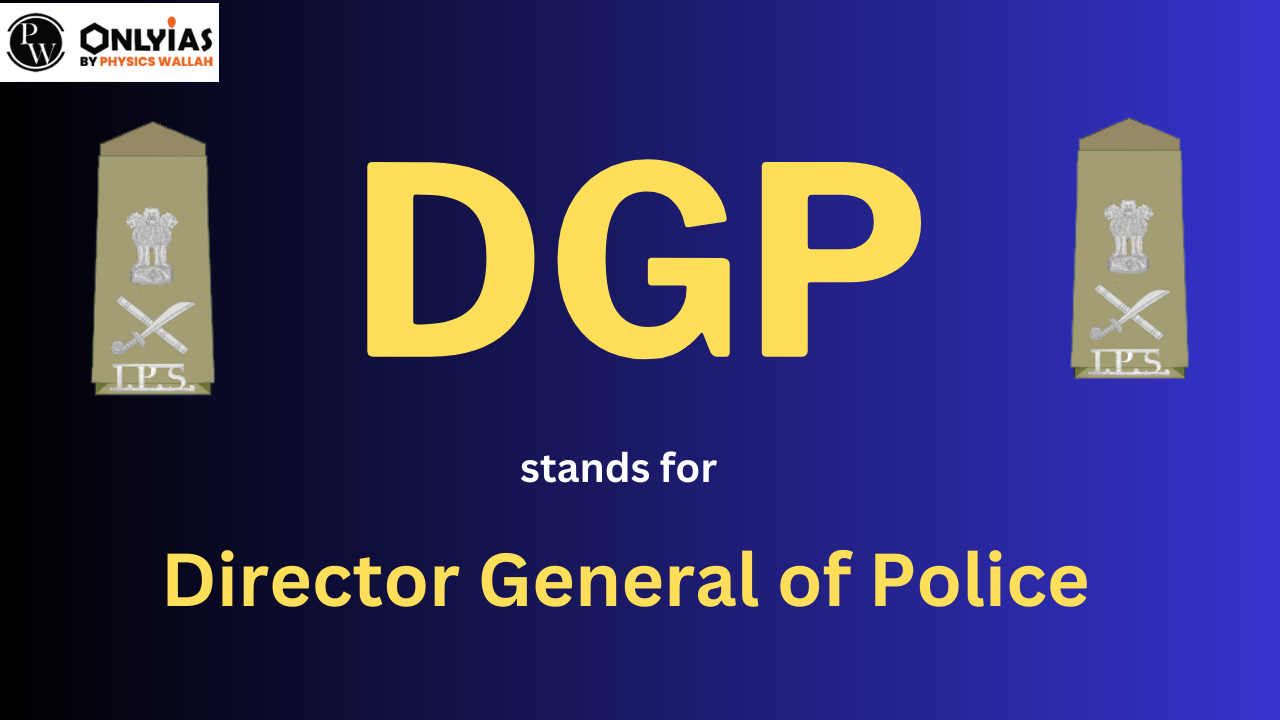![]() Ananya Gupta
Ananya Gupta
![]() August 29, 2023 07:38
August 29, 2023 07:38
![]() 3838
3838
![]() 0
0
DGP full form stands for Director General of Police. The DGP is a prominent position within the police force, responsible for strategic leadership, law enforcement, and ensuring public safety. Learn more about the significance and roles of the DGP in maintaining law and order.

DGP Full Form: DGP, which stands for Director General of Police, is a prestigious and high-ranking position within the police force. The DGP is responsible for providing leadership, strategic direction, and overall management of the police department in a state or a country. This role plays a crucial part in maintaining law and order, ensuring public safety, and upholding the principles of justice and security. The DGP’s responsibilities encompass a wide range of tasks, including crime prevention, investigation, coordination with other law enforcement agencies, and community engagement. This position requires strong leadership skills, a deep understanding of law enforcement practices, and a commitment to serving and protecting the public.
| DGP Full Form | |
|---|---|
| DGP Full Form in English | Director General of Police |
| DGP Full Form in Hindi | डायरेक्टर जनरल ऑफ पुलिस |
| Appointed | Cabinet and Holds a Three-star rank |
| Meaning | The highest-ranking police officer in a state or territory, responsible for overall law enforcement and management. |
The Director General of Police (DGP) is the highest-ranking police officer in a state or union territory in India. The DGP is responsible for overseeing the entire police force and law enforcement activities within the respective jurisdiction. This position holds significant authority and plays a crucial role in maintaining law and order, implementing crime prevention strategies, and ensuring public safety. The DGP is usually appointed by the state government and works closely with other law enforcement agencies and government officials to uphold the rule of law and protect citizens’ rights.
The Director General of Police (DGP) holds a significant and multifaceted role within the police force, encompassing a wide range of responsibilities to ensure effective law enforcement, public safety, and the overall well-being of the community. Some of the key roles and responsibilities of a DGP include:
1. Leadership and Strategic Direction:
2. Law Enforcement and Crime Prevention:
3. Public Safety and Security:
3. Personnel Management:
4. Community Engagement and Relations:
5. Policy Formulation and Implementation:
6. Coordination and Collaboration:
Collaborating with other government agencies, judiciary, and civil society organizations to ensure comprehensive approaches to security and justice.
7. Legal Compliance and Human Rights:
8. Budgeting and Resource Allocation:
9. Public Relations and Communication:
The selection and appointment of the Director General of Police (DGP) vary based on the jurisdiction and the state’s or union territory’s policies. However, there are certain common principles and procedures followed in many regions of India. Here is an overview of the typical process:
The Director General of Police (DGP) holds immense significance within a state or union territory’s law enforcement system. Their role is pivotal in ensuring effective governance, law and order, and the overall safety and security of the public. The significance of the DGP can be understood through the following points:
1. Leadership and Direction: The DGP provides leadership and strategic direction to the entire police force. Their guidance shapes the priorities, policies, and strategies that govern law enforcement activities.
2. Law and Order: The DGP is responsible for maintaining law and order within the jurisdiction. They play a crucial role in preventing and addressing crime, ensuring public safety, and upholding the rule of law.
3. Crisis Management: During crises, emergencies, or natural disasters, the DGP’s decisions and actions are instrumental in managing situations, minimizing damage, and protecting lives and property.
4. Policy Formulation: The DGP is involved in formulating and implementing policies related to law enforcement, crime prevention, community engagement, and public safety.
5. Coordination: The DGP collaborates with other law enforcement agencies, government departments, and community organizations to ensure coordinated efforts in maintaining security and order.
6. Personnel Management: As the head of the police force, the DGP oversees the recruitment, training, and professional development of police personnel, ensuring a skilled and disciplined workforce.
7. Community Trust: Building and maintaining trust between the police and the community is crucial. The DGP’s approach to community engagement and relations influences public perception and cooperation.
8. Strategic Planning: The DGP’s strategic planning shapes the allocation of resources, deployment of personnel, and implementation of innovative technologies for effective law enforcement.
9. Public Representation: The DGP represents the police force in public events, interacts with the media, and communicates with the public to ensure transparency and accountability.
10. Legal Compliance: The DGP ensures that police operations adhere to legal standards, human rights, and ethical principles. They play a role in safeguarding the rights of citizens.
12. National Security: In certain regions, the DGP’s responsibilities may extend to matters of national security, counter-terrorism efforts, and coordination with central security agencies.
DGP का पूरा नाम “डायरेक्टर जनरल ऑफ पुलिस” है। डीजीपी, यानी डायरेक्टर जनरल ऑफ पुलिस, पुलिस विभाग के भीतर एक प्रतिष्ठित और उच्च स्थान है। डीजीपी की जिम्मेदारी एक राज्य या संघ क्षेत्र के पुलिस विभाग की प्रमुखता, रणनीतिक मार्गदर्शन और सामान्य प्रबंधन होती है। इस भूमिका का महत्व कानून और व्यवस्था की रक्षा, सार्वजनिक सुरक्षा, और न्याय और सुरक्षा के सिद्धांतों को बनाए रखने में होता है।
<div class="new-fform">
</div>

Latest Comments